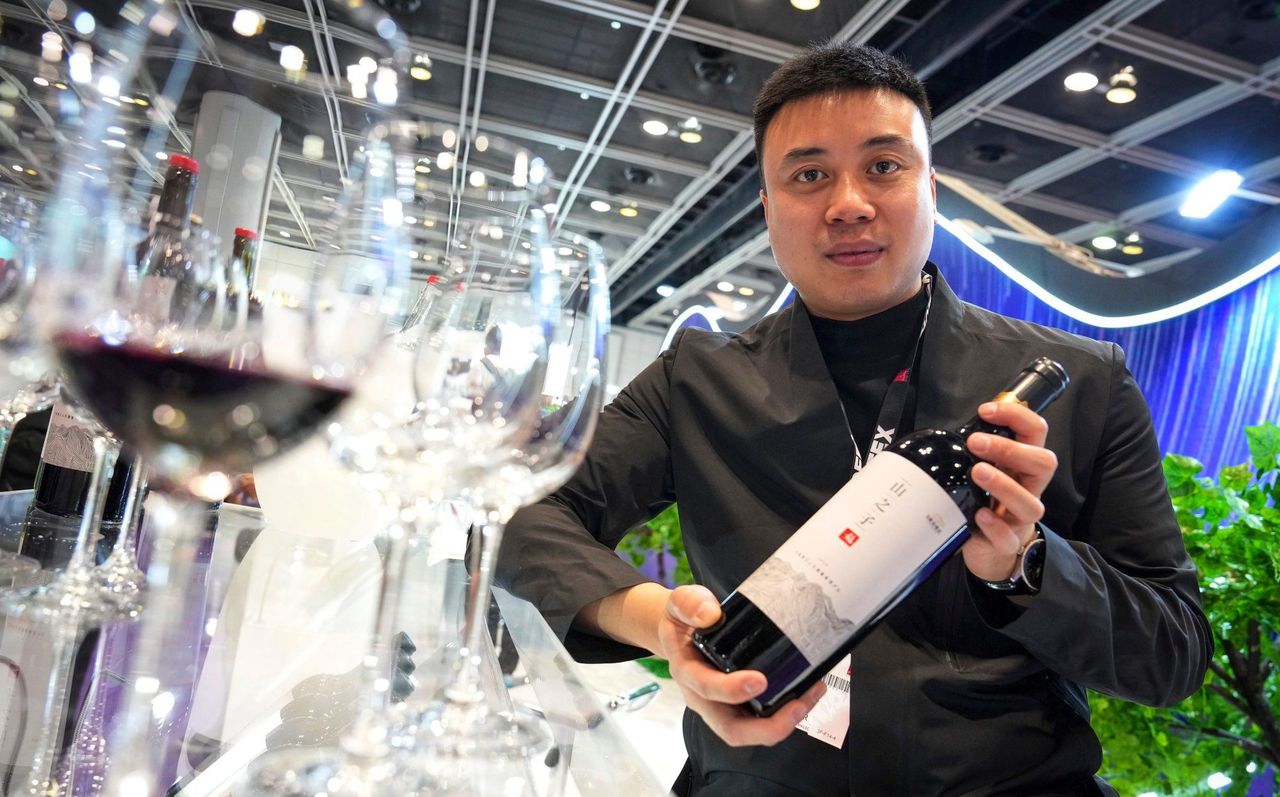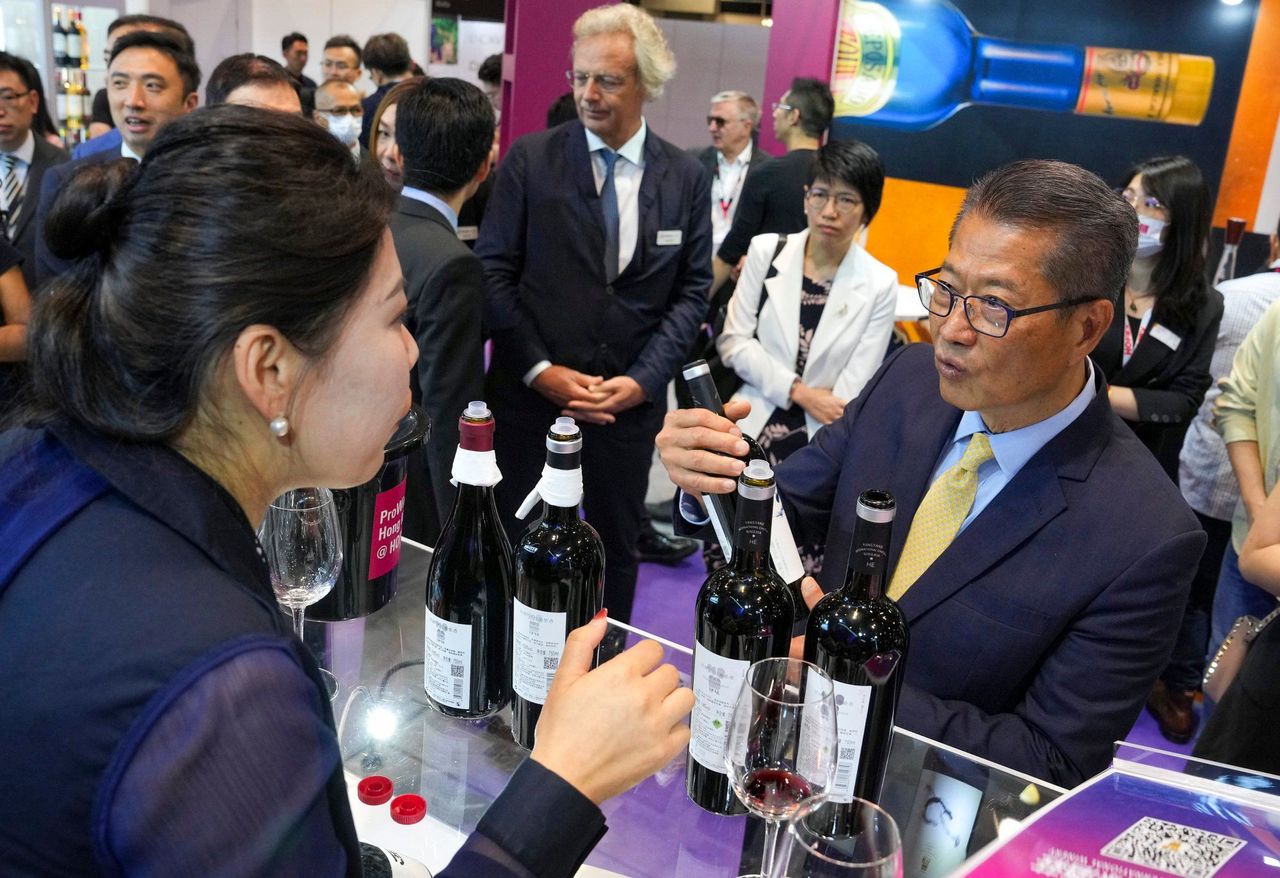Hong Kong News

Global wine blitz by mainland China’s Ningxia to use Hong Kong as export base
Ningxia, mainland China’s answer to the famous Bordeaux region, is to launch a booze blitz on the world using Hong Kong as a springboard after Sino-French diplomacy put Chinese wine in the world’s spotlight, industry leaders have said.
They were speaking after a 50-strong delegation from wineries in the Ningxia area of the country descended on the ProWine Hong Kong exhibition, which features wines from around the world, to promote the Chinese industry in the wake of its role in international diplomacy between President Xi Jinping and French leader Emmanuel Macron.
“Domestic wines do not have a convenient channel for export or spreading brand images to the world,” said Zhe Xiao, vice-general manager of the region’s Yuashi Winery.
“People may not know Ningxia well, but everyone knows Hong Kong and that we could use as a stepping stone to achieve better promotion.”
 Zhe Xiao, vice-general manager of Yuanshi Winery, at Hofex, Asia’s
leading food and hospitality trade show, being held in Hong Kong this
week.
Zhe Xiao, vice-general manager of Yuanshi Winery, at Hofex, Asia’s
leading food and hospitality trade show, being held in Hong Kong this
week.
The delegates from 16 vineyards from the Helan region in northwest China were among 140 international exhibitors at the three-day ProWine Hong Kong, part of the Hofex show.
The event is the biggest food and drink trade show held in the city since restriction-free travel with the mainland resumed.
Lu Yongliang, a senior official at Helan Hong Winery, agreed the city could play a major role in raising the profile of Ningxia wines around the world.
The winery’s Helan Hun Hero Edition Reserve Cabernet Sauvignon, Merlot, Cabernet Franc dry red wine was one of six bottles, a half case, given the official seal of approval by Xi, who gifted them to Macron after an informal meeting in Guangzhou last month.
Lu said Xi’s decision to promote the products was evidence that Ningxia wine had reached world-class quality.
“The gesture is more trustworthy than putting up an advertisement to promote our wine,” Lu said.
Ningxia is China’s premier wine region, with an annual output of 138 million bottles, almost 40 per cent of the country’s total, and competes with other wineries based in Shandong, Yunnan and Xinjiang.
Zuo Ying, general manager of the Ningxia Lilan Winery, said he wanted to meet more international wine traders and have the opportunity to promote the quality of the Chinese product.
“Hong Kong is a big trading area with a lot of people from other countries. I wish to introduce more choices for them and remove the bad perception of Chinese products. We are capable of making decent wines,” Zuo said.
The winery’s Lancui Prime Vineyard cabernet sauvignon dry red was also included in the half case Xi gifted to Macron.
Financial Secretary Paul Chan Mo-po said at the trade show, which opened at the Hong Kong Exhibition and Convention Centre on Wednesday, that the city remained the region’s top wine-trading and distribution centre.
Chan noted the city re-exported 45 per cent more wine, worth HK$2.3 billion (US$294 million), last year compared with 2021.
Macau and the mainland accounted for nearly 70 per cent of the city’s re-export destinations.
“Given Hong Kong’s zero-wine duties and our advanced logistics network, I am confident that international wine companies will tap into the region’s fast-growing markets,” Chan said.
 FInancial Secretary Paul Chan tours Hofex at the Exhibition and Conference Centre.
FInancial Secretary Paul Chan tours Hofex at the Exhibition and Conference Centre.
Paulo Pong Kin-yee, founder of Hong Kong-based wine wholesaler and retailer the Altaya Group, said the gift of Ningxia wine by Xi to Macron was a huge boost.
“It is very significant for Ningxia wine, especially a gift to France, a world leader in high-quality wine production,” he said.
Pong, also on the standing committee of the Ningxia Hui Autonomous Region of the Chinese People’s Political Consultative Conference (CPPCC), said Xi’s gesture was “an endorsement”.
“From President Xi’s perspective, he gave the choice wine to his guest,” Pong added.
Xi visited a vineyard in Yinchuan near the Helan Mountains of Ningxia in 2020 and emphasised “the wine industry has great prospects, with the continuous improvement of people’s living standards”.
Pong said the size of the Helan delegation, a mix of state-owned enterprises and private companies, was unprecedented.
He said some of them had spent about 20 years growing vines in the region, which is at the same latitude as Bordeaux.
Pong added some of the production was limited, positioned at the top end of the market and could command between HK$1,000 and HK$4,000 per bottle.
“They know the value of scarcity. Some even put out two barrels, or 600 bottles, a year and the production doesn’t happen annually.”
Leung Chun-ying, a vice-chairman of the National Committee of the CPPCC, the country’s top political advisory body, led a business team, including Pong, to Ningxia in March.
He said he saw great potential after his fifth trip to the area in the past five years.
“Hong Kong has been doing well in wine trading as an international hub. The trade associations and trading companies are sufficient to promote the expansion of the business in the city,” he said. “I think the ecosystem is well established.”
Leung added: “The government should also use the Ningxia wine business to underscore the fact Hong Kong can integrate into the development of the country in new sectors such as wine trading and new geographies such as Ningxia.”
Shuai Zekun, a connoisseur veteran at American critic James Suckling’s online site, said Ningxia wines aroused global interest because of their rich style, close to the ones made in Australia and the Napa Valley in the United States.
“Ningxia wines are rich, opulent and flavourful. To me, they sometimes taste a bit like lychee and black fruits,” Shuai said.
“But some of them still need to catch up on enhancing the finesse and layer. I believe, in the future, their top wineries will definitely devote more energy to those elements.”











